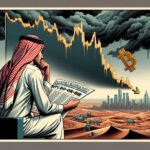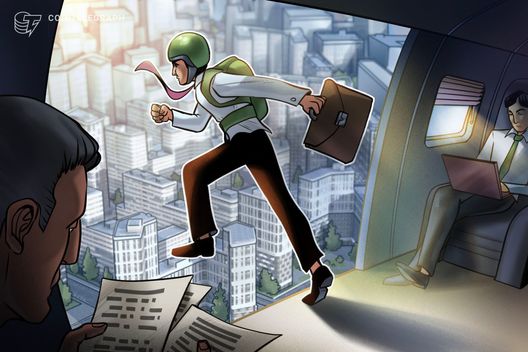Nouriel Roubini, famously known as Dr. Doom for foreseeing the 2008 financial crisis, has recently issued a stark warning to traders navigating the current turbulence in financial markets. This instability predominantly stems from President Donald Trump’s recently announced tariffs on international trade, including a staggering 104% tax on certain Chinese imports. His bold measures have sent shockwaves through global markets, leading to significant losses; the Nasdaq 100 has plummeted by 12%, while Bitcoin (BTC), the leading cryptocurrency, faced a 10% drop, dipping below $75,000. Such fluctuations ignite fears reminiscent of liquidity crises seen in the past, particularly the one sparked by the COVID-19 pandemic.
In the wake of this turmoil, traders are keenly speculating about the Federal Reserve’s next moves. Anticipation runs high for interest-rate cuts, similar to the actions taken in 2020 to buoy asset prices. However, Roubini believes that Fed Chair Jerome Powell may adopt a more measured approach, insisting that Powell will likely wait for President Trump to soften his stance before intervening. “There is, of course, a game of chicken between the Trump put and the Powell put,” Roubini explained to Bloomberg, suggesting that the Fed’s response hinges on Trump’s next moves rather than immediate economic conditions.
“The strike price for the Powell put is going to be lower than the strike price for the Trump put, meaning Powell is going to wait until it’s Trump who blinks.”
This chronicle of market sentiment underlines just how intertwined U.S. trade policies and monetary policies have become. The unpredictable nature of Trump’s announcement on potential trade negotiations, once dubbed ‘fantasy news’, can unerringly lead to swift market reactions, illuminating the volatile interplay between tariffs and economic stability.
Furthermore, Roubini has expressed a belief that despite the rampant speculation regarding a looming recession, the U.S. economy may not face back-to-back contractions as many are predicting. He attributes this outlook to continued inflationary pressures resulting from higher tariffs, which might, in turn, hurt longer-dated bonds. This complex landscape fuels ongoing discussions among economists and policymakers alike, as market participants continue to brace for the ripple effects of these trade dynamics.

Economic Insights from Roubini on Market Instability
Renowned economist Nouriel Roubini, known for accurately predicting the 2008 financial crisis, offers critical insights into current market dynamics influenced by U.S. tariffs. Here are the key points from his analysis:
- Federal Reserve’s Response Hesitation:
- The Federal Reserve may not immediately intervene to stabilize the market due to uncertainties surrounding Trump’s tariffs.
- Roubini suggests the Fed will wait for Trump to adjust his approach before taking action.
- Impact of Trump’s Tariffs:
- Trump’s tariffs have raised concerns about a potential recession, with markets reacting negatively.
- The tariff on Chinese imports has been increased to 104%, contributing to market instability.
- Market Volatility Indicators:
- The Nasdaq 100 index saw a 12% decline, alongside a 10% drop in bitcoin prices.
- Increased volatility in the U.S. Treasury market with surging yields is present, indicating investor uncertainty.
- Speculation on Interest Rate Cuts:
- Traders expect five quarter-point interest rate cuts from the Fed this year.
- Roubini warns that these cuts may not materialize until there is significant change in political rhetoric from Trump.
- Inflation and Economic Projections:
- Roubini expects persistent inflation due to higher tariffs impacting economic dynamics.
- Despite fears, he believes the U.S. won’t face a recession, contradicting market sentiment suggesting a high likelihood of economic downturn.
Roubini mentions, “There is, of course, a game of chicken between the Trump put and the Powell put. But I would say that the strike price for the Powell put is going to be lower than the strike price for the Trump put.” This emphasizes the delicate balance of political factors influencing economic stability.
Nouriel Roubini’s Warnings: A Cautionary Tale Amid Market Turmoil
Nouriel Roubini, famed for his accurate prediction of the 2008 financial crisis, has once again alerted traders to the precarious state of the financial markets, influenced by geopolitical tensions sparked by President Trump’s trade policies. While Roubini’s insights offer a valuable perspective, they also highlight an important debate within the financial community regarding the response of the Federal Reserve to such instability.
Roubini’s assertion that traders should not depend on the Fed for immediate relief stands in stark contrast to a more optimistic outlook held by some analysts who anticipate proactive measures, similar to the Fed’s interventions in 2020 during the COVID-19 crisis. On one hand, the potential for interest-rate cuts could buoy market confidence and provide some support to investors. On the other hand, if the Fed opts to remain on the sidelines, as Roubini suggests, it could exacerbate already heightened volatility and trigger a liquidity crisis. The core of Roubini’s argument revolves around the idea that the Fed may prioritize the political landscape before taking action, which could prolong market instability.
The scenario creates a dual-edged sword for various market participants. For conservative investors, particularly those invested heavily in long-dated bonds, Roubini’s caution signals a potential need for reevaluation of their strategies in a landscape with sticky inflation and rising yields. Conversely, day traders and speculators might find opportunities amid the heightened volatility, as quick reactions to news such as unconfirmed tariff negotiations can lead to rapid market movements. Roubini’s analysis indicates that sentiment can shift drastically with small changes in political rhetoric, benefiting those agile enough to capitalize on these fluctuations.
However, Roubini’s view could pose significant challenges for institutions and traders banking on a less cautious approach from the Fed. As interest rates remain uncertain and tariff tensions linger, entities that fail to brace for possible economic headwinds might suffer steep losses. The potential for a continued downturn, particularly in tech-heavy indexes like the Nasdaq and in high-flying assets like Bitcoin, underscores the fragility of the current market conditions and the risk of a market correction.
Ultimately, as investors navigate these turbulent waters, Roubini’s warnings resonate with the caution needed in today’s uncertain economic climate. His forecasts underscore the importance of a vigilant and adaptive investment strategy that accounts for both domestic policies and international trade dynamics in determining the state of financial markets.

















